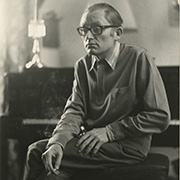In 1958 Jean Barraqué composed music for a project for the ‘Theatre of the Absurd’ which never made it to the stage. 60 years later it is now finally receiving its première in Vienna.
The fact that Jean Barraqué had written a Musique de scène was known largely through the work of Heribert Henrich – the original manuscript has now been evaluated by the musicologist Laurent Feneyrou in the Bibliothèque nationale de France and is being published for the first time by Bärenreiter. In addition, the dramas of Jean Thibaudeau, on which Barraqué’s music is based, were thought to be lost. At Wien Modern the Sirene Opera Theatre is featuring the work as part of a theatre project in its production “Die Reise” [The Journey]. Marie Luise Maintz spoke with Jury Everhartz, the director of “Sirene”.
[t]akte: Your production is the culmination of a long piece of detective work on Barraqué’s Musique de scène. So, a long journey for this work – has this been the starting point for your production?
Everhartz: At the moment there are very many movements in our, and in many other, neighbouring societies. Even before we read the play texts by Jean Thibaudeau, we could make out a travel itinerary from the headings of the individual miniatures. However, our starting point was not the texts themselves, but the original idea with which Jacques Polieri brought Jean Thibaudeau and Jean Barraqué together in 1958: namely, to work on a project in which different artists from all possible areas were to participate autonomously. That was already a journey, though we understand “journey” to mean a project with an uncertain outcome. Of course the long journey of the texts was itself an exciting thing.
What kind of texts are Jean Thibaudeau’s? How do you approach them?
Thibaudeau wrote a few short short dramas which cannot readily be presented as regards content. The experience of the absurd is to the fore here; he wrote of course in the idiom of his time. We see the model of Samuel Beckett immediately. There is a certain dramaturgical arch, a movement, a journey into one’s own self, questions which are answered through this, the fact that you perhaps cannot ask them at all. These texts are of high historic value, but in the freshness and directness of their poetic inventiveness, they definitely have a certain virulent quicksilver quality. We won’t play everything, nor in the right order; rather with no order at all, as we want to send our audience on a journey of a quite special kind. We feel invited to participate in this journey, as if Jacques Polieri himself had asked – but I think that we will also live up to the texts by Jean Thibaudeau with a somewhat more condensed focus. In the process we naturally also have to solve one or another linguistic problems; Thibaudeau indeed worked – this is very French – in a language-orientated way. And even the simple difference between “je” and “moi” cannot readily be portrayed in German.
How do you respond to Barraqué, the well-known unknown?
Barraqué’s music is a declaration in a radical way which is almost unimaginable today. We could say, he meant it really seriously. Behind him there is only death, otherwise there are no compromises, no free play. Therein lies a certain dichotomy: the attempt to say something absolute is paradoxically indeed a very personal statement. The truly objective soon encounters the truly subjective – and the other way round too. And in a dichotomy there is always a dynamic which we also capture with the title “Die Reise” [The Journey]. With the Musique de scène we come very close to Barraqué’s working method, we can sense how the plan for a large-scale work was created – but it is indeed a fragment. In the process we are at the foundation of the first invention – and this incredibly great loneliness which shapes Barraqué’s work. With this music we experience the beginning of a work, a departure to the other side – with the open question of what will be there for us to actually find. Once again just one’s own self, or the great other? Barraqué writes according to very strict rules, but through the extended technique of serial composition he developed, he is also very close to the unknown. We perform his music in this way; seldom do the sublime and the ridiculous stand so close together.
What is not in question is the pathos of this art. For you, the director, the set designer, what is it that is particularly interesting on this project?
The larger and more important part lies in darkness, beneath the surface. And even if you want to drill holes, undo buttons, undress, reveal, open and dismantle – you only ever find – and nothing other than ... surface. The hidden remains hidden, you can only immerse yourself in it in the imagination. That is the tension between Barraqué and Thibaudeau …
(Translation: Elizabeth Robinson)
(from [t]akte 2/2017)



